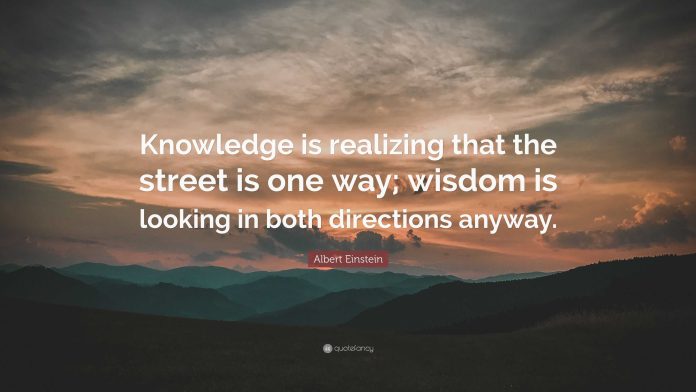Wisdom and knowledge are not the same. One can have much wisdom and be short of knowledge. On the other hand, one can have much knowledge and hardly any wisdom to speak of. Sooner or later we meet up with such people and are at least slightly perplexed by the discrepancy.
When we meet up with those who preen themselves on their possession of abundant knowledge. we admire their knowledge but are put off by their seeming belief that they have acquired all that is most important in life. At the same time, we meet occasionally people who are blessed with timely and impressive insights, and who also seem rather modest as to their achievements. We do not mock them, as we might mock the haughty and stern Dr. Know-it-all. At bottom this is because in the one party we detect virtue, but in the other party more so unlikeable vanity.
If wisdom and knowledge are not the same, how are they alike and how are they different? They are certainly alike in that both may be handed down from generation to generation. They are alike in that both may be acquired from teachers, books, experience, observation, intuition, etc. They are alike in that both may be actively pursued and heartily avoided.
But they are not alike in that we know instinctively there is a fundamental difference. The larger category is knowledge, and wisdom is necessarily a type of knowledge. But knowledge is not necessarily wisdom. There is good knowledge and there is bad knowledge, or true knowledge and false. There is never bad wisdom or false wisdom. With a minimum amount of knowledge we can still survive picking fruit from a tree or potatoes from the ground; with a minimum amount of wisdom, we are in danger of being doomed, as all fools sooner or later are more or less exposed to danger.
A case in point:
In 1939, as World War II was commencing, fears were mounting in the scientific community that Germany might be on the road to discovering how to use nuclear energy in a warlike manner. Albert Einstein, teaching at Princeton, was persuaded by several scientists to write a letter to the President of the United States, an excerpt of which follows:
August 2nd, 1939
F.D. Roosevelt,
President of the United States,
White House
Washington, D.C.
Sir:
Some recent work by E. Fermi and L. Szilard, which has been communicated to me in manuscript, leads me to expect that the element uranium may be turned into a new and important source of energy in the immediate future. Certain aspects of the situation which has arisen seem to call for watchfulness and, if necessary, quick action on the part of the Administration. I believe therefore that it is my duty to bring to your attention the following facts and recommendations:
In the course of the last four months it has been made probable—through the work of Joliot in France as well as Fermi and Szilard in America—that it may become possible to set up a nuclear chain reaction in a large mass of uranium by which vast amounts of power and large quantities of new radium-like elements would be generated. Now it appears almost certain that this could be achieved in the immediate future.
This phenomenon would also lead to the construction of bombs, and it is conceivable—though much less certain—that extremely powerful bombs of a new type may thus be constructed. A single bomb of this type, carried by boat and exploded in a port, might very well destroy the whole port together with some of the surrounding territory.
The result of this letter is that Roosevelt immediately arranged for the Manhattan Project to begin. Three atomic bombs were secretly constructed, one for testing and two for ending the war with Japan. This knowledge of nuclear weaponry led to the obliteration of the Japanese cities of Hiroshima and Nagasaki in 1945, killing between 129,000 and 226,000 citizens, mostly civilians. President Roosevelt never lived to see the two events. President Truman, his successor, did, and seems from abundant evidence not to have regretted his own order to drop the bombs.
Einstein did regret, and in later years he also regretted his decision to begin what would later amount to a nuclear arms race between the United States and the Soviet Union, destined to hold out the danger of universal doom, which it still does with China, North Korea, and Iran (another axis of evil) having entered the race.
So, it seems, in this case Einstein could be said to have had great scientific knowledge, but at the time of his letter to Roosevelt, lacked prophetic wisdom. That is, he failed to look both ways when encountering a one way street sign.










